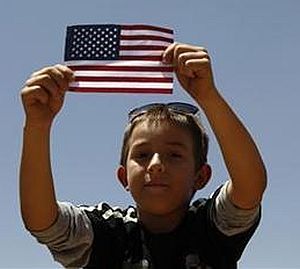 This year the US Citizenship and Immigration Services received thousands of more applications than the number of H-1B visas it can grant
This year the US Citizenship and Immigration Services received thousands of more applications than the number of H-1B visas it can grant
Arguing that limiting the number of H-1B visas would have an impact on global competitiveness of American firms, an influential Indo-US business advocacy group has called for expanding the number of the work visas granted to foreign technology professionals every year.
"One of the areas where the US has to look at is H-1B. How do you expand that?
"By limiting the numbers (of H-1B visas), it does have an impact on the US companies.
"By making it expensive, it does have an impact on US companies," Mukesh Aghi, president of the US India Business Council told PTI.
Under Congressional-mandated existing laws, the United States every year grants 60,000 H-1B visas and another 20,000 to those foreign professionals who get higher degrees from a US university.
This year the US Citizenship and Immigration Services received thousands of more applications than the number of H-1B visas it can grant, forcing it to decide on the successful applicants through a computerised draw of lots.
Documented research and statistics have proven time and again that H-1B is one of the major drivers of US economy, in particular in the field of innovation and entrepreneurship.
While H-1B is not a major issue this presidential election cycle, but New York-based Real Estate tycoon Donald Trump, who is leading Republican presidential polls, came out with recommendation to increase the salary for H-1B visas, which along with his other proposals would make it tough for US companies to hire foreign workers on H-1B visas.
Indian technology professionals are one of the major beneficiaries of H-1B visas.
For quite some time leading US technology companies including Microsoft, Facebook and Google have been calling to do away with the limit on H-1B visas.
In response to a question, Aghi dismissed the recent proposal of Trump.
"Politicians make proposals just to attract votes. Our position is that Indian workers who come on H-1B visa do bring efficiency and competency to US companies," said Aghi, who before joining USIBC was Member of Board and CEO of Larsen and Toubro InfoTech.
"We support H-1B and we would like to expand it," he said.
When asked about Trump's proposal to hike the basic salary of H-1B visa proposals, the USIBC president, said no one can ‘dictate’ corporations what kind of salary it needs to pay to its employees.
"Because it is not business of the government to be in business," he asserted, adding that it should be decided by market forces.
"If India does the same thing that you got to pay minimum salary to US people coming to India then it does have an impact on US cost structure.
“It can be reciprocal. Not just with India, it can be with any other country," he observed.










